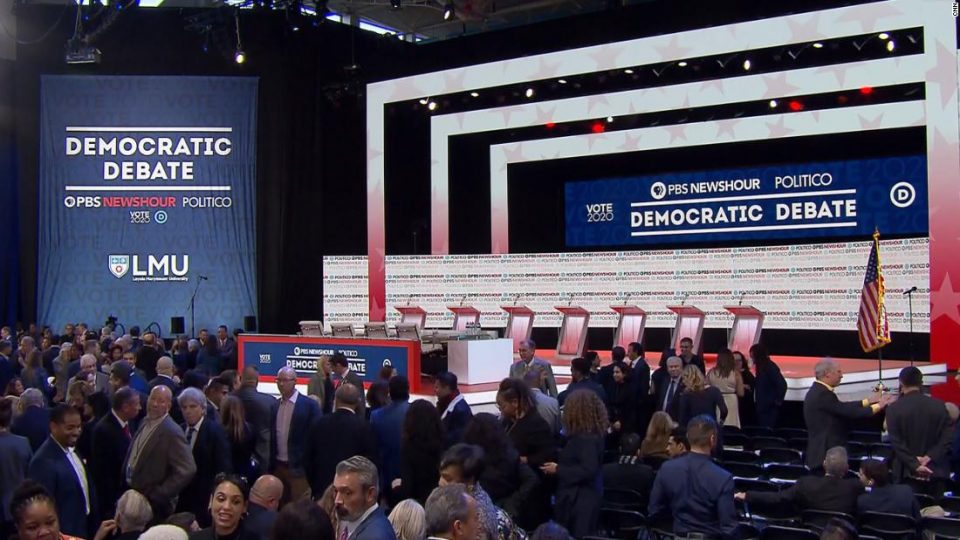Thursday’s debate was hosted by PBS and Politico, and came a day after the House of Representatives impeached President Donald Trump. It also came the same day the House voted to approve Trump’s US-Mexico-Canada Agreement.
Just a month and a half before the Iowa caucuses, the three-hour debate offered candidates a chance to delve more deeply into their policy disagreements than they had in their five previous clashes.
Only seven candidates met the party’s thresholds for qualification this time: former Vice President Joe Biden, Vermont Sen. Bernie Sanders, Massachusetts Sen. Elizabeth Warren, South Bend, Indiana, Mayor Pete Buttigieg, Minnesota Sen. Amy Klobuchar and businessmen Andrew Yang and Tom Steyer.
Klobuchar said, “If you look at the poll[s], at the state that knows me best, and that is the state of Minnesota, it showed in the state that Hillary had her lowest margin of victory, it showed that I beat Donald Trump by 18 points.”
Facts First: She’s basically right about the polls, but she’s wrong about the 2016 election results.
— Marshall Cohen
Yang links Trump’s 2016 victory to shifts in manufacturing employment
Yang, whose campaign has focused on the threat automation poses to US workers, claimed that President Donald Trump’s 2016 win was in part because “we blasted away 4 million manufacturing jobs” — and further claimed that 40,000 manufacturing jobs have been lost in Iowa.
Facts First: This is true, but only if you look back as far as the early 2000s. US manufacturing employment actually went up during President Barack Obama’s second term, and that’s continued under Trump.
Similarly, Iowa lost jobs during that period, shedding a total of 20,900 jobs, according to the Bureau of Labor Statistics.
The Bureau of Labor Statistics showed 385,000 additional manufacturing jobs were added between January 2013 and January 2017.
Since Trump took office, the sector has added another 497,000 jobs.
— Anneken Tappe
Biden on 1 million Uyghurs
Asked about steps the US could take to address the rise of China, Biden said: “What we have to make clear is that we, in fact, are not going to abide by what they have done. A million Uyghurs, as you pointed out, Muslims, are in concentration camps. That’s where they are right now. They’re being abused.”
Facts First: Concrete numbers on this issue are hard to come by. But the latest numbers from the US government and human rights organizations support Biden’s claim.
—Tara Subramaniam
Klobuchar on GOP efforts to suppress African-American votes
Klobuchar accused Republicans of trying to improve their chances in future elections by suppressing the African-American vote, which has historically gone in favor of Democrats by large margins.
“They have made it harder for African-Americans to vote,” Klobuchar said. “As one court said, ‘discriminated with surgical precision.'”
Facts First: Klobuchar got the quote right, and the rest of her claim is largely true. Republican-controlled legislatures across the country have passed laws aimed at preventing voter fraud that have made it harder for African-Americans to vote, and some of these laws have been declared unconstitutional by federal judges.
But that might be easier said than done: Elections are run by the states, not the federal government. So if Klobuchar becomes president, she’d have limited influence over state officials who administrate elections and have overseen the recent purges.
— Marshall Cohen
Yang and Sanders on black maternal mortality
In response to a question about being the only non-white candidate on stage, Yang pointed to statistics on disenfranchisement among communities of color, noting that “if you’re a black woman, you’re 320% more likely to die from complications in childbirth.” Sen. Bernie Sanders later echoed the claim, asserting that “black women die three times at higher rates than white women.”
Facts First: The candidates are correct — black women die from childbirth complications more than three times as often as do white women, according to government medical data.
The study showed that about 700 women die due to pregnancy-related complications in the United States each year.
— Caroline Kelly
Sanders on arms spending
Calling for an international effort to fight the climate crisis, Sanders criticized global spending on weapons.
“And maybe, just maybe, instead of spending $1.8 trillion a year globally on weapons of destruction, maybe an American president — i.e. Bernie Sanders — can lead the world. Instead of spending money to kill each other, maybe we pool our resources and fight our common enemy, which is climate change,” Sanders said.
Facts First: Sanders was speaking imprecisely. The $1.8 trillion figure represents all global military spending in 2018, not spending on weapons in particular.
“Military expenditure refers to all government spending on current military forces and activities, including salaries and benefits, operational expenses, arms and equipment purchases, military construction, research and development, and central administration, command and support,” the Institute said.
— Daniel Dale


